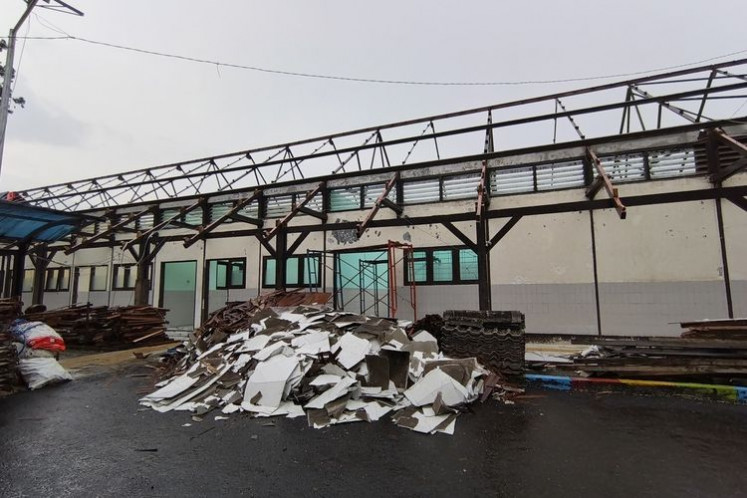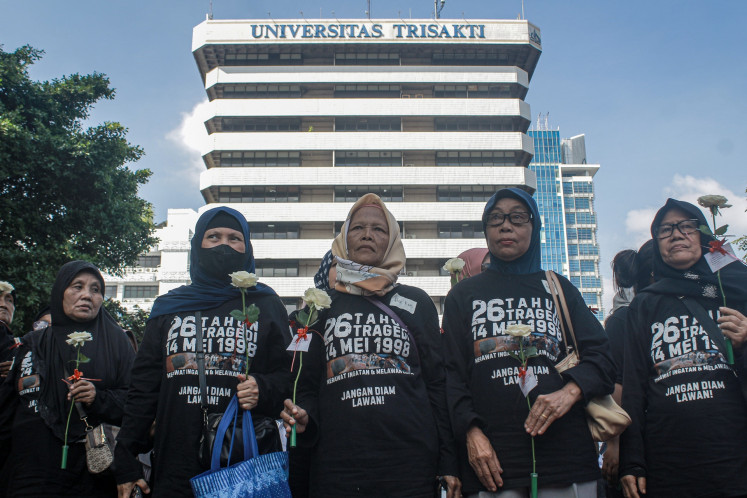Pangolin smuggling for crystal meth thwarted
Elusive creature: A Law Enforcement and Security Agency official at the Environment and Forestry Ministry holds a live pangolin during a media conference in Medan, North Sumatra, on Wednesday
Change text size
Gift Premium Articles
to Anyone

E
span class="caption">Elusive creature: A Law Enforcement and Security Agency official at the Environment and Forestry Ministry holds a live pangolin during a media conference in Medan, North Sumatra, on Wednesday. Balawan Navy personnel seized 225 pangolins, 110 of which were alive, that were to be smuggled to Malaysia.(JP/Apriadi Gunawan)
Its unique characteristics make the pangolin the world’s most trafficked wild mammal and an attractive target for hunters. Believed to hold many benefits, the elusive ant eater is sought for its meat and scales.
Some believe pangolin meat is good for health and sex drive. Their scales, meanwhile, can be used for traditional medicine, fashion items like shoes and even as an ingredient for narcotics like crystal methamphetamine, locally known as sabu-sabu.
Balawan Navy Base personnel recently thwarted an alleged attempt to smuggle of 1 ton of live and dead pangolins to Malaysia to be used for sabu-sabu. The Navy personnel seized the pangolins from a warehouse on Jl. KL Yos Sudarso in Medan Deli, Medan, in North Sumatra on Monday. They also apprehended two suspects named Sudirman and Ermanto, both 43 years of age. The Navy handed the case over to the Law Enforcement and Protection Agency at the Sumatra Environment and Forestry Agency for further investigation.
A total of 225 pangolins were seized, including 110 live animals, in addition to nine sacks of pangolin scales weighing a total of 1 ton found in the warehouse. With the goods valued at around Rp 2.5 billion (US$188,197) on the black market, the incident marks the biggest illegal wildlife attempt foiled by the Navy, Belawan Navy Base commander Commodore Roberth Wolter Tappangan said.
The discovery was based on intelligence reports about illegal goods kept at the warehouse. The pangolins are sourced from several areas of Sumatra, including Binjai and Langkat in North Sumatra and Jambi.
“Information we gathered from the suspects reveal a plan to smuggle the pangolins to Malaysia. The scales were to be processed into sabu-sabu that was to be brought back to Indonesia,” he said on Tuesday.
NGO Protection of Forest & Fauna (Profauna) reported last year that using pangolin scales in the meth industry involved cruel practices. The scales are sloughed through a boiling process while the animals are still alive.
The scales are believed to contain Tramadol HCL, a substance found in crystal meth, according to Riau University environment and health expert Ariful Amri.
“Tramadol HCL is also an active substance for analgesics that can be used as a painkiller for chronic illnesses or post-operation,” he said, as reported by Antara in 2010.
Halasan Tulus, the head of the agency, said the foiled trade was part of a systematic wildlife trading operation run by an international syndicate. The suspects were allegedly involved in a case of pangolin trafficking to Malaysia last year, when authorities seized 103 pangolins from Belawan,
“This is the biggest pangolin-smuggling incident in Sumatra that we have ever handled. The smuggling of the protected animals involves an old and international syndicate,” he said at a press conference on Wednesday.
The poachers mostly send pangolins to China and Vietnam, the biggest consumers of Indonesian pangolins.
It is not known how many pangolins are left in Indonesia, but they mostly live in lowland areas of North Sumatra, such as the regencies of Sibolangit, Dairi and Central Tapanuli.
A pangolin can sell for up to Rp 5 million on the domestic market and four times that price overseas.
“Who would not be tempted by the fantastic price?,” Halasan said, adding that the seized pangolins found alive would be released in the Ciranggas conservation area in Dairi, while the dead ones would be used as evidence in court.
This marks the latest large case of pangolin-smuggling in the country. Besides the case in Belawan last year, officials in Surabaya, East Java, seized 1.3 tons of frozen pangolin bound for Singapore in 2015 and 657 frozen pangolins the following year.
The International Union for Conservation of Nature (IUCN) has classified pangolins as critically endangered, one rank below extinct in the wild. No data is available on the population of the elusive creature, but it is known that more than one million pangolins have been killed in the last decade and that around 100,000 are captured each year.









